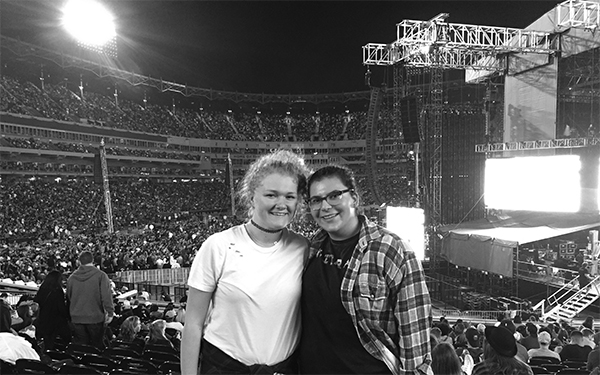Rap music objectifies women, desensitizes their listeners

February 10, 2017
My first ever concert was Taylor Swift. A few years later and I’m attending her arch-nemesis’ concert-none other than Kanye West. A drastic difference, I know.
Perhaps I was too caught up in the ‘Taylor Swift is a liar’ movement, possibly leaving a snake emoji or two on one of her Instagram pictures. However, when West performed “Famous,” he replayed the infamous lyrics bashing Swift four times leaving the entirety of the United Center to fill in the blanks. At that moment, without thinking, I chanted what was being said.
I’m not one to question West’s “artistic” decision to perform the song as he did and I’d hate to put words in his mouth – god-forbid anyone speak for Kanye – but I was left questioning why West felt the need to repeat the lyrics four times or even include them in the song in the first place. Who is Kanye to claim Swift’s rise to fame or degradingly refer to her using the term “bitch?” More so, why can a rapper release a song denouncing women for millions to hear and perpetuate such a message?
Rappers have strange terminology when it comes to women, ranging from the less offensive, depending on the context, “shorty,” to “bitch.” It’s certainly unacceptable to call someone a “bitch” in real life but in rap, there are no consequences. By belittling women, it seems rappers are able to boost their self-esteem, a classic reason why bullies bully.
Just like books are adapted into movies, misogynistic lyrics are adapted into music videos. Women are used to appeal to the audience and the rappers themselves with a big butt and boobs, light skin and wearing little clothing, not to mention, unrealistic body standards. It’s not the women in the videos that bother me, it’s how they are depicted in the background, displayed through small clips in between verses of a song and shown standing next to the rapper’s side. This creates the ideology that hot girls make rappers more attractive and powerful.
Music videos by female rappers including Nicki Minaj, probably the most prominent female rapper in pop culture, also show women with unrealistic bodies. However, Minaj isn’t just a background dancer. Minaj is unapologetic about how she portrays herself and speaks out for women and encourages them to own who they are, which is what I respect most. Minaj has shut down the double standard women face, encourages female empowerment, powers through constant judgement and the list goes on. Though I don’t enjoy most of her music, she paves the way for other female rappers.
In between referring to women as “bitches” and “hoes,” rap can depict abusive, violent treatment toward women. Beyond lyrics, these actions can be translated into reality. In 2009, Chris Brown physically assaulted his then-girlfriend, Rihanna. After a plea deal, Brown was sentenced to serve six months of community service and five years of probation, which he later violated. As awful as this situation was, Brown is still largely accepted in the rap industry.
Ultimately, it’s our fault that these lyrics and actions are accepted. We download the music, go to the concerts and watch the music videos. So while they create the message, we spread it.
I fall into this trap too. Though songs containing misogynistic lyrics aren’t my first choice, I find myself almost every day singing along to 107.5 or 92.3 in the car. To me, these lyrics are an afterthought to the other rap songs and artists that I enjoy more. Yet, I’m still questioning if this is justified.
My favorite type of music is rap, but it’s also my least favorite type of music. The thing about rap, or at least good rap music, is that it is real. Rap has its roots in violence and poverty, constructing meaningful songs. Though I or many others can’t directly relate to these themes, other themes of rap including social change, are more appealing and complex than womanizing rap. In other words, here is what makes up a bad rap song: the shout of the artist’s name, something about drinking, drugs or women, a featured artist and a wrap up about drinking, drugs or women.
Not every rapper produces music with misogynistic lyrics and no, this doesn’t just include Macklemore. Plenty of rap is inspiring and honest and in my opinion, this is the best kind of rap. I choose songs that don’t alter my morals and more importantly don’t take away from the beauty of rap.


